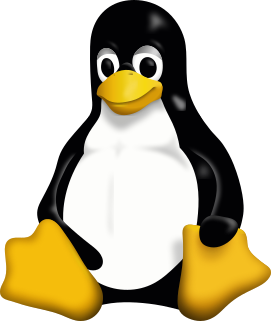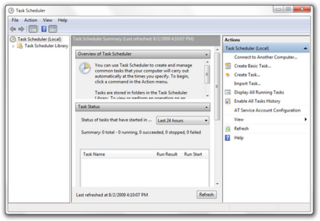
Bash is a Unix shell and command language written by Brian Fox for the GNU Project as a free software replacement for the Bourne shell. First released in 1989, it has been distributed widely as the default login shell for most Linux distributions and Apple's macOS. A version is also available for Windows 10. It is also the default user shell in Solaris 11.

Cygwin is a POSIX-compatible environment that runs natively on Microsoft Windows. Its goal is to allow programs of Unix-like systems to be recompiled and run natively on Windows with minimal source code modifications by providing them with the same underlying POSIX API they would expect in those systems.

Free software or libre software is computer software distributed under terms that allow users to run the software for any purpose as well as to study, change, and distribute it and any adapted versions. Free software is a matter of liberty, not price: users—individually or in cooperation with computer programmers—are free to do what they want with their copies of a free software regardless of how much is paid to obtain the program. Computer programs are deemed free insofar as they give users ultimate control over the first, thereby allowing them to control what their devices are programmed to do.

The GNU Debugger (GDB) is a portable debugger that runs on many Unix-like systems and works for many programming languages, including Ada, C, C++, Objective-C, Free Pascal, Fortran, Go and partially others.
In computing, at is a command in Unix-like operating systems, Microsoft Windows, and ReactOS used to schedule commands to be executed once, at a particular time in the future.

The GNU Project is a free-software, mass-collaboration project, first announced on September 27, 1983 by Richard Stallman at MIT. Its aim is to give computer users freedom and control in their use of their computers and computing devices, by collaboratively developing and providing software that is based on the following freedom rights: users are free to run the software, share it, study it and modify it. GNU software guarantees these freedom-rights legally, and is therefore free software; the use of the word "free" always being taken to refer to freedom.
Job Control Language (JCL) is a name for scripting languages used on IBM mainframe operating systems to instruct the system on how to run a batch job or start a subsystem.
The software utility cron is a time-based job scheduler in Unix-like computer operating systems. People who set up and maintain software environments use cron to schedule jobs to run periodically at fixed times, dates, or intervals. It typically automates system maintenance or administration—though its general-purpose nature makes it useful for things like downloading files from the Internet and downloading email at regular intervals. The origin of the name cron is from the Greek word for time, χρόνος (chronos).
In computing, time is a command in Unix and Unix-like operating systems. It is used to determine the duration of execution of a particular command.
The exit status of a process in computer programming is a small number passed from a child process to a parent process when it has finished executing a specific procedure or delegated task. In DOS, this may be referred to as an errorlevel.

In computing, rm is a basic command on Unix and Unix-like operating systems used to remove objects such as computer files, directories and symbolic links from file systems and also special files such as device nodes, pipes and sockets, similar to the del command in MS-DOS, OS/2, and Microsoft Windows. The command is also available in the EFI shell.
anacron is a computer program that performs periodic command scheduling, which is traditionally done by cron, but without assuming that the system is running continuously. Thus, it can be used to control the execution of daily, weekly, and monthly jobs on systems that don't run 24 hours a day. anacron was originally conceived and implemented by Christian Schwarz in Perl, for the Unix operating system. It was later rewritten in C by Itai Tzur; maintainers have included Sean 'Shaleh' Perry and Pascal Hakim. It is a dependency of cronie which is maintained by Red Hat, and Red Hat updates to cronie have included updates to anacron as well.

Richard Matthew Stallman, often known by his initials, RMS, is an American free software movement activist and programmer. He campaigns for software to be distributed in a manner such that its users receive the freedoms to use, study, distribute and modify that software. Software that ensures these freedoms is termed free software. Stallman launched the GNU Project, founded the Free Software Foundation, developed the GNU Compiler Collection and GNU Emacs, and wrote the GNU General Public License.

Linux is a family of free and open-source software operating systems based on the Linux kernel, an operating system kernel first released on September 17, 1991 by Linus Torvalds. Linux is typically packaged in a Linux distribution.

Task Scheduler is a component of Microsoft Windows that provides the ability to schedule the launch of programs or scripts at pre-defined times or after specified time intervals: job scheduling. It was first introduced in the Microsoft Plus! for Windows 95 as System Agent but was renamed to Task Scheduler in Internet Explorer 4.0 and Windows 98. The Windows Event Log service must be running before the Task Scheduler starts up.

GNU Emacs is the most popular and most ported Emacs text editor. It was created by GNU Project founder Richard Stallman. In common with other varieties of Emacs, GNU Emacs is extensible using a Turing complete programming language. GNU Emacs has been called "the most powerful text editor available today". With proper support from the underlying system, GNU Emacs is able to display files in multiple character sets, and has been able to simultaneously display most human languages since at least 1999. Throughout its history, GNU Emacs has been a central component of the GNU project, and a flagship of the free software movement. GNU Emacs is sometimes abbreviated as GNUMACS, especially to differentiate it from other EMACS variants. The tag line for GNU Emacs is "the extensible self-documenting text editor".
Toybox is a free and open-source software implementation of some Unix command line utilities for embedded devices. These include ls, cp, mv, and about 150 others. The Toybox project was started in 2006, and became a BSD-licensed BusyBox alternative. Toybox is included with Android 6.0 "Marshmallow" and all later Android versions, and is also available for installation on certain other operating systems.
Web2py is an open-source web application framework written in the Python programming language. Web2py allows web developers to program dynamic web content using Python. Web2py is designed to help reduce tedious web development tasks, such as developing web forms from scratch, although a web developer may build a form from scratch if required.

Unix is a family of multitasking, multiuser computer operating systems that derive from the original AT&T Unix, development starting in the 1970s at the Bell Labs research center by Ken Thompson, Dennis Ritchie, and others.











